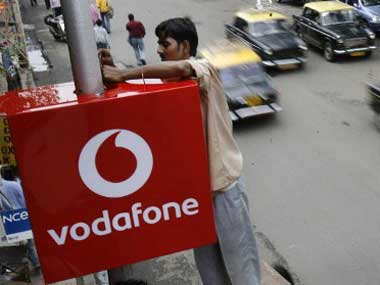By R Jagannathan
Despite all the bark and bluster, is Vodafone quietly trying to settle its tax case with the government through a compromise?
And if it is, why is it doing so, when everyone in the world - from the British Chancellor to the Dutch government to US Treasury Secretary Tim Geithner - has been batting for Vodafone and lobbying against the retrospective tax proposed in Pranab Mukherjee’s March budget?
Has Vodafone realised that it is not on as solid a ground as it thought after the Supreme Court ruled in its favour last January? The court held that Vodafone was not obliged to withhold capital gains tax when it bought Hutchison Essar’s Indian operations in 2007 in an all-offshore deal.
A report in The Economic Times, which has no confirmations from Vodafone, suggests that the telco has indeed approached the finance minister with an offer that could include payment of the Rs 11,000-12,000 crore tax it was supposed to deduct while buying Hutchison’s Indian telecom operations. In return, Vodafone reportedly wants the government to waive penalty and interest amounting to another Rs 8,000 crore.
[caption id=“attachment_294201” align=“alignleft” width=“380” caption=“The SC last January held that Vodafone was not obliged to withhold capital gains tax when it bought Hutchison Essar’s Indian operations in 2007 in an all-offshore deal.AFP”]  [/caption]
The newspaper quoted an official as saying that the discussions were preliminary in nature, and thus there could be no certainty over the outcome. Such settlements could also be difficult to accept in the current political climate where any concession to a private party will spark rumours of payoffs and skullduggery.
However, the very fact that such talks are being hinted at suggest a thaw in the Vodafone position, and it is worth figuring out what the reason for it could be.
For one, even though Vodafone has invoked the Indo-Netherlands Bilateral Investment Treaty (BIT) to claim protection of its investments, there is always a question-mark over whether BIT can be invoked in a tax dispute.
Second, Indian courts have usually bowed to the executive in many cases of retrospective legislation. Hence Vodafone cannot be sure it will be second time lucky with the Supreme Court - when the fact is even the Bombay High Court found in the government’s favour before the Supreme Court finally gave it victory.
Third, and this could be the real reason, Hutchison Whampoa - the company which sold the telecom operations to Vodafone - is said to be keen on returning to India for business. If this is true, then its entry would be blocked by the Vodafone case since the tax is actually payable by Hutchison, not Vodafone. Vodafone was merely supposed to deduct the tax on behalf of the Indian taxman.
In an interview last week, Finance Secretary RS Gujral hinted that paying tax may have been Vodafone’s responsibility in its deal with Hutchison. He told Business Standard: “In their own wisdom, Vodafone took a call and remitted the payment (to Hutchison) without withholding the tax. Now, what the (tax) officers, while raising the demand, have also mentioned is, according to their information, an amount higher than the final one paid by Vodafone was offered by some other party (to Hutchison). Perhaps the difference reflects the tax amount.”
As _Firstpost_ noted, Gujral also said: “One can seek to conclude that Vodafone, in its agreement with Hutchison, took advantage of a lower price and said any responsibility of tax was on its account. That is why Vodafone is fighting so hard. Otherwise, in normal business transactions, if a person is a buyer, he will put a clause that if any tax is levied, the seller would be liable to pay. Clearly, it is an issue in which they took a gamble that perhaps they would be able to avoid tax, and whatever they avoid, becomes their profit.”
If Gujaral’s interpretation is correct, and if Hutch is coming back to India, Vodafone has to pay up.
Is this why Vodafone is now ready to blink in its eyeball-to-eyeball with the finance ministry? Watch this space.


)
)
)
)
)
)
)
)
)



